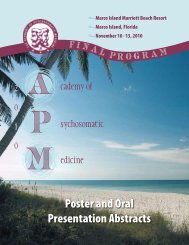Table of Contents - Academy of Psychosomatic Medicine
Table of Contents - Academy of Psychosomatic Medicine
Table of Contents - Academy of Psychosomatic Medicine
You also want an ePaper? Increase the reach of your titles
YUMPU automatically turns print PDFs into web optimized ePapers that Google loves.
in March 2009 as her symptoms had gotten worse. Additionally,<br />
she was noted to have weekly episode <strong>of</strong> sudden rage<br />
and anger with paranoia where she would start screaming<br />
and accusing her husband <strong>of</strong> poisoning her and refusing all<br />
cares.<br />
Management: Risperdal was initiated which made her more<br />
agitated, paranoid and she also developed suicidal ideations.<br />
At this point she was admitted to inpatient psychiatric unit.<br />
Medical workup was unremarkable except for mild UTI which<br />
was treated. EEG showed diffuse background slowing, but<br />
no seizure activity. CT head showed bilateral frontal encephalomalacia<br />
left more than right. Risperdal was discontinued<br />
and Seroquel was initiated. She responded well to Seroquel<br />
during her 12 day stay in the hospital, her delusions and<br />
paranoia had subsided. Two weeks post hospital follow up<br />
she was not seeing the doubles <strong>of</strong> her husband and had no<br />
episodes <strong>of</strong> paranoid rage.<br />
Conclusions: This case illustrates patients with traumatic<br />
brain injury can develop Capgras delusions anytime. Her history<br />
<strong>of</strong> SAH and specifically frontal encephalomalacia puts<br />
her at a high risk for developing Capgras delusion, as it is<br />
postulated in the literature that frontal region involvement is<br />
common in Capgras delusions. Also, Seroquel could potentially<br />
be used for treatment <strong>of</strong> Capgras Delusion<br />
70. Patients’ Medical Decision-Making<br />
Capacity and Educating Primary Care<br />
Physicians: A Pilot Study<br />
Presenting Author: Abhishek Jain, MD<br />
Co-Authors: Nolan Hughes, MD, Kevin Patterson, MD, Kurt<br />
Ackerman, MD, PhD<br />
Background: Medical decision-making capacity (DMC) continues<br />
to be a prevalent, complicated, and <strong>of</strong>tentimes misunderstood<br />
topic among primary care physicians (Appelbaum<br />
2007). The purpose <strong>of</strong> this research study is to determine<br />
whether a lecture and discussion on patients’ DMC will be<br />
beneficial to primary care clinicians in improving objective<br />
knowledge and subjective comfort with this topic.<br />
Methods: Family practice residents and attendings were administered<br />
a pre-test, with 5 questions on subjective comfort<br />
and 15 questions on objective knowledge, related to medical<br />
DMC. Then, a 45-minute lecture and discussion on DMC,<br />
including key components, common misconceptions, and<br />
case examples, was presented. The same pre-test, along<br />
with a feedback form for the presentation, was then readministered.<br />
Results: Twenty-two participants attended the 45-minute<br />
lecture and discussion and completed the pre and posttests.<br />
Complete statistical analyses are ongoing. Preliminary<br />
data indicates a mean pre-test objective score <strong>of</strong> 7/15(47%)<br />
and a mean post-test objective score <strong>of</strong> 11/15(73%), with<br />
all 22 participants’ scores improving. Preliminary data from<br />
the subjective questions indicate improved comfort in all<br />
participants.<br />
Conclusions: This pilot suggests that a 45-minute didactic<br />
session on patient’s medical DMC for primary care<br />
29<br />
physicians improves both subjective comfort and objective<br />
knowledge. Assessing long-term retention <strong>of</strong> this knowledge<br />
and the effect on clinical outcomes will be examined in future<br />
studies.<br />
References: Applebaum P. Assessment <strong>of</strong> Patients’ Competence<br />
to Consent to Treatment. NEJM 2007; 357; 1834-40.<br />
71. The Role <strong>of</strong> the Forensic Psychiatrist in<br />
the General Hospital<br />
Presenting Author: Elizabeth A. Davis, MD<br />
Co-Authors: Fabian M. Saleh, MD, Rebecca W. Brendel,<br />
MD, JD, FAPM<br />
This poster illustrates the multiple services a practicing forensic<br />
psychiatrist can provide in a general hospital setting.<br />
The forensic psychiatrist can fulfill functions that are beyond<br />
the scope <strong>of</strong> consultation liaison psychiatrists, ethicists, and<br />
risk management. The role is primarily to educate staff regarding<br />
legal issues concerning hospitalized patients and to<br />
minimize risk on behalf <strong>of</strong> both patients and the institution.<br />
A forensic psychiatrist can help staff navigate a complicated<br />
legal system that, on the one hand, serves to protect patient<br />
autonomy, and on the other, interferes with the expedient<br />
delivery <strong>of</strong> clinical care. These conflicting needs and multiple<br />
pressures necessitate such as role. Frequently the forensic<br />
psychiatrist consults around matters <strong>of</strong> discharge planning<br />
involving dangerous and/or incompetent patients, limits<br />
<strong>of</strong> confidentiality, malpractice, treatment refusal, substitute<br />
decision-making, and informed consent. Functions also include<br />
petitioning for guardianships on behalf <strong>of</strong> patients who<br />
lack capacity, as well as risk management around transfers<br />
between medical and surgical departments and psychiatric<br />
units.<br />
72. Neutropenia Associated with Mirtazepine<br />
use in a Liver Transplant Recipient<br />
Presenting Author: Marie Tobin, MD<br />
Co-Authors: Helen Te, MD, Giuliano Testa, MD<br />
Background: Mirtazepine, like other tetracyclic antidepressants<br />
is known to cause neutropenia/agranulocytosis. (1)<br />
Despite this mirtazepine is particularly useful in Consult-<br />
Liaison psychiatry because <strong>of</strong> beneficial effects on sleep<br />
and appetite. Immunocompromised patients are at risk <strong>of</strong><br />
blood dyscrasias either as the result <strong>of</strong> disease process or<br />
immunosuppressive agents, including post-transplantation<br />
patients.<br />
Purpose: We here describe a case <strong>of</strong> neutropenia associated<br />
with mirtazepaine use in a liver transplant recipient.<br />
Results: Five months after living donor liver transplantation<br />
this patient presented with depression and anxiety which responded<br />
to sertraline 100mg daily. Sertraline was discontinued<br />
because <strong>of</strong> persistent diarrhea and the patient was started<br />
on mirtazepine 15 mg daily. Four days later the patient<br />
had was noted to have a WBC <strong>of</strong> 1.4 K/uL (3.5-11) and an<br />
absolute neutrophil count (ANC) <strong>of</strong> 0.78 (1.12-6.72). At that<br />
time, her immunosuppressive regime was mycophenolate



